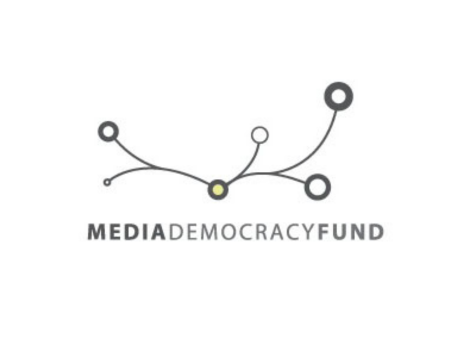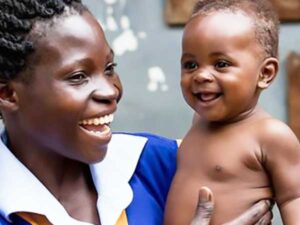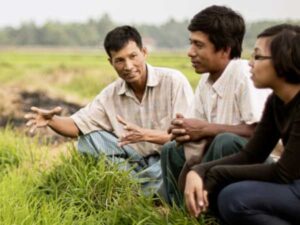Media Democracy Fund is a field catalyst that brings together diverse voices to design inclusive and responsible solutions, particularly ensuring that digital technologies and the internet have a long-term, positive impact on society.
Amber French of Media Democracy Fund spoke with Ashley Hopkinson on January 31, 2024. Click here to read the full conversation with insights highlighted.
Ashley Hopkinson: Can you start out by introducing yourself and explaining what problem your organization was created to address, and how you are working towards solving that problem?
Amber French: I’m Amber French, Executive Director of the Media Democracy Fund [MDF]. The internet has been a transformative tool, and also an incredibly disruptive one. As the internet and digital technologies have matured, they have become increasingly commercialized and controlled by a handful of tech giants and state actors. Many of the most popular platforms and services rely on the extraction and monetization of personal data, which of course gives bad actors the technological tools to be disruptive and divisive within the broader information ecosystem. These dynamics are only accelerating with the recent introduction of large language models and generative AI technologies.
At MDF, our work focuses on ensuring that technology does not amplify inequality, but is instead used as a tool to advance racial justice and equity. We believe that in order for the internet to live up to its promise, we need equitable access, accountability, and a digital society that supports powerful community-based efforts, particularly for those that have been historically marginalized.
Ashley Hopkinson: How does your organization reach the particular group of people that you serve? And how would you say those people benefit from the work that you do?
Amber French: We are a field catalyst, so it’s our job to bring together diverse voices in order to design the inclusive and responsible solutions that we need to have impact. Since our founding in 2006, the MDF has worked to build a network and define a community of civil society stakeholders through extensive collaboration with advocates, researchers, scholars, and philanthropic organizations in the US, Europe, and other regions.
Ashley Hopkinson: What makes your organization distinct?
Amber French: Our organization has a unique approach to strategy development and solution building. We look for the most difficult challenges that technology presents to society, and then work with our diverse community of stakeholders to create solutions, often by leveraging research and policy development, training, movement building strategies, or philanthropic education. We’ve done a lot of work within the philanthropic community to educate and orient funders on the importance of the issues we face, enabling us to better convene and coordinate strategy. We also do grant-making.
Ashley Hopkinson: As a systems-change organization, how do you measure success?
Amber French: When MDF first launched in 2006, a lot of our work revolved around educating people on the importance of these issues. Everyone wanted to know, “What is the internet? Do I need a website? How do I think about the transition to digital?” So really, the way that public understanding of technology has hugely evolved is evidence of the success of our work.
But more significantly, a marker of MDF’s success is a significant increase in public understanding of the harms caused by digital and data-driven technology, which has resulted in broad public support for strategic interventions into making online spaces more supportive of the world that we want to see.
Ashley Hopkinson: Can you share an example of a project that illustrates the impact of the work that your organization does?
Amber French: MDF’s impact can really be seen in our Disinfo Defense League project. The league is an incredibly broad network of civil rights and social justice organizations that we convened to focus on the issue of racialized disinformation, in order to collaboratively develop a set of strategies to protect the voices of communities of color.
Ashley Hopkinson: What challenges do you face in doing this work?
Amber French: One of the most significant challenges for the field is a narrative challenge: the idea that technology can solve all of our problems. There’s a very common notion that technology is sort of inherently positive in its impact but unclear in its harms. The truth is that tech-related harms are well-documented and well-understood, and we need to have appropriate mechanisms in place to ensure accountability.
Ashley Hopkinson: How has your organization worked to overcome that narrative challenge?
Amber French: We love technology, but we believe in the need for accountability for and critique of the roles that these entities play in perpetuating harm. It’s not an either-or. We need to lean into a more balanced understanding that we can and should be able to enjoy the benefits of technology, while doing so in a way that we know that we’re protected when we use these tools. That we have privacy around the use of our bank cards, but also privacy around the way in which companies utilize our digital data to understand things about us that they don’t need to know.
Ashley Hopkinson: Can you share an insight or lesson you’ve learned in doing this work?
Amber French: We believe deeply in the importance of collaboration, and I think particularly for this set of issues, in order to build solutions, we really do need to lean into collaboration because no one organization, philanthropic institution or person can make the change on their own. The technology is accelerating incredibly quickly. It’s difficult to keep track even at different points about what’s happening, so we really do need to rely on the community of people who care about racial justice and equity and who understand what public interest interventions need to look like.
Ashley Hopkinson: Considering how quickly technology changes, has there ever been a time that your organization learned and grew as a result of attempting to put something into practice that did not go as planned?
Amber French: The rapid pace of innovation in the technology sector is a significant challenge to anybody doing this work. And also I think the slow pace of policy reform is a challenge that matches that. And the fact that even as technology has evolved and changed over time, we’re still fighting policy battles from 10 years ago that aren’t necessarily completed yet. So what does that teach us? I mean, I think it is really important to be as thoughtful as we possibly can be in the way that we’re thinking about strategy development and we’re thinking about interventions.
At the same time, we need to remain nimble and really keep our finger on the pulse of what’s happening and look for key opportunities and interventions to close chapters from the past that haven’t been completed while we’re also thinking about, all right, how do we make sure that we actually have the structures and mechanisms in place that we’re going to need five or ten years from now, now, so that we’re not constantly sort of in this catch-up mode the way that we have been in the first part of the history of the digital age.
Ashley Hopkinson: What does being forward-thinking look like for your organization?
Amber French: It’s tracking the way that technology is evolving. Again, in the early days of MDF, we were concerned about things like the digital television transition, mobile phones, etc. And then you sort of have the shift to smartphones and the way that these technologies impacted the way that people communicate and also consume information. And so that all continues to be a set of dynamics that folks in this sector need to pay attention to as well as the way in which these technologies are being used. Where are people leaning into community spaces using these technologies? How is information being shared across platforms and in different places? What do platforms look like now and how do old platforms or legacy platforms evolve over time? How has that impacted communities there? These are all the kinds of conversations that the folks in our space have frequently and are thinking deeply about.
Ashley Hopkinson: How is your organization working towards systems change?
Amber French: It’s much more investing in these collaborative co-design processes with different kinds of stakeholders in the field, depending on what the challenge is or what the intervention or what the strategy may be. And then ensuring that the ideas that are generated have the kind of resources that they need in order to be effective, whether that’s coordination support, whether that’s funding, whether that’s deeper research or examination of an issue in a different way. Convening is of course another tactic that we use a lot as well.
Ashley Hopkinson: What would your organization like to see more of from other actors in this space?
Amber French: Capacity is always a challenge for philanthropy as well as folks working in the field. The issues are massive. There’s a lot of waterfront to cover, and we just don’t have the level of resources that we need given the scale and scope of the problem. So I think that’s a really significant challenge. And then I think to the degree to which capacity constraints sort of force folks to make tough choices, sometimes it makes it harder to collaborate. It’s harder to just have the staff time or organizational capacity to engage in the kind of cross-sector collaborations that we need people to be doing.
Ashley Hopkinson: Where would you like to see Media Democracy Fund go in the next few years? What would you say is your vision for the organization, your hope?
Amber French: We are at the beginning of the next chapter in the history of the digital age. Technology has always accelerated at a rapid pace and it will continue to do so, which means there’s a lot that we don’t know. So for us right now, the future is about remaining nimble and responsive, and leaning into the future-oriented work and practice that we’ve honed over our history to ensure that we continue to have impact.
Click here to read the full conversation with insights highlighted.
Ashley Hopkinson is an award-winning journalist, newsroom entrepreneur and leader dedicated to excellent storytelling and mission-driven media. She currently manages the Solutions Insights Lab, an initiative of the Solutions Journalism Network. She is based in New Orleans, Louisiana.
* This interview has been edited and condensed.
Read other insights on what’s working in social impact.







